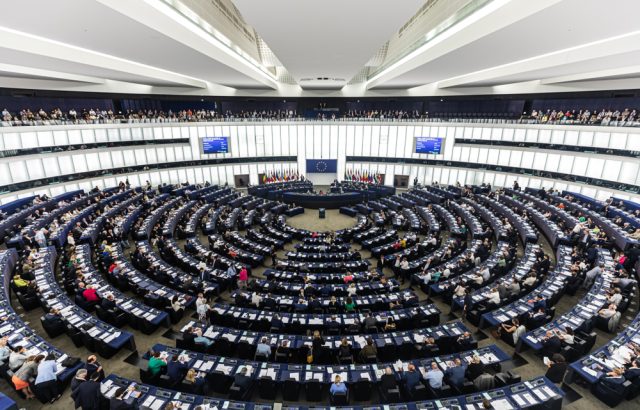
The year 2024 is a special year defined somewhat by the fact that about half of the planet’s population – 4 billion people – will vote. More than 70 countries around the world – including the US and Russia, which will elect their presidents – will hold domestic elections, and in EU bloc countries voters will have to nominate their representatives to the European legislature.
For the Romanians, 2024 is a real test of electoral endurance, as they will have to elect their representatives to the European Parliament, as well as to local authorities, the national legislature and the country’s president. The issue of the merger of elections was launched by the leaders of the ruling PSD-PNL coalition in Bucharest last year and has been widely debated and criticised, especially by the opposition. The recently announced final decision to merge local and parliamentary elections will put Romanians in front of no fewer than five ballots on the 9th of June – for the appointment of MEPs, mayors, local councillors, county council president and county councillors. So the whole process can be expected to be cumbersome, possibly with longer queues and waiting times than usual, and probably not without incident on this front. As for the other elections, according to the Coalition’s political decision, the presidential elections have been set for September and the elections for the national parliament – in December.
All these elections would have meant no less than four elections and a total of five Sundays – the presidential election having two rounds which will most likely take place both because it is hard to imagine any of the candidates getting more than 50% of the votes in the first round. At least that’s what the polls tell us and Romania’s post-December history shows, with none of the presidents since the 1989 Revolution failing to win office in the first round. Thus, the idea of merging some of these elections seems natural, especially since the fundamental law, the Constitution, does not prohibit this. However, ever since the idea of merging some of the elections was launched in the public arena, there have been counter-arguments, ranging from the legal to the moral side of the issue. Despite criticism from the opposition and civil society, the government in Bucharest finally decided to merge the presidential and parliamentary elections, but not as it seemed more natural, but rather the local elections and the European parliamentary elections. Why would it be more natural? Because this is constitutionally possible and, after all, it was the practice until they were separated with the extension of the President’s term of office from 4 to 5 years when the Romanian Constitution was last amended in 2003. On the other hand, Romania would not be the first country to make such a merger, as it is a common practice in European countries and, although it is not recommended by the Venice Commission, it has not expressed any firm negative position on the subject. In addition, there is also the precedent of 2019, when, being combined with the referendum on Justice, Romanians turned out in record numbers to vote, with a record turnout of 49.02%, similar percentages being achieved only in presidential elections.
200 million euros cost Romania’s last elections
In addition, there is the financial argument for merger, although it doesn’t hold much water. Under the scenario run late last year by the Permanent Electoral Authority, which envisaged a merger of two of the four elections, the costs would be only 10-15% higher than the 2020 elections, when there were two elections – local and general. Of course, the amount is not insignificant – in 2020 the elections cost about 1 billion lei – that is 200 million euros, so 20 – 30 million lei more is not a negligible amount. Although, in theory, fewer polls would mean less money, there will be no fewer ballot papers, no fewer premises and no fewer people involved in managing the polls. Because people can vote anywhere in the European elections, the authorities will have to set up separate polling stations for local and parliamentary elections. However, the different spaces do not seem to be a sufficient guarantee that the local vote will not be rigged. Precisely because Romanians will be able to vote anywhere in the European Parliament elections, not only in their locality of residence, at the polling station to which they are assigned, there is a risk of the return of “electoral tourism”, a phenomenon that may not have disappeared for good, but in recent elections has increasingly less or not at all contaminated the results of elections in Romania.

On the other hand, the half-year gap between local and parliamentary elections could throw the country into political and administrative chaos. The first concern of the new mayors and county council presidents will be to build the majorities in their councils needed to pass their projects – which will be extremely difficult during an election campaign – and not the organisation of the next elections. Last but not least, the President of Romania who will be elected in September will have to wait a few months for the old head of state to finish his mandate.
“A crime against democracy”, an act of birth “of the single PNL-PSD party” and the return to power of the FSN of 1990, is how the leaders of the opposition Right Force see the merger of elections.
Similarly, the far-right conservatives of the AUR see the merger as an attempt to rig the election. If there had been a gap of at least a few months between the European and local elections, the AUR, which expects to do well in the European parliamentary elections, being on the European wave of the rise of right-wing extremism, would have been able to recruit many of the current PSD and PNL mayors for the local elections. And AUR, a party formed before the 2020 elections and propelled into Parliament by the votes of the diaspora, needs viable candidates for the local elections like water, given that, in these four years, it has failed to build structures in the territory and has nowhere to take visible candidates, known to the electorate, except from the other parties.
“There is a saying in politics and war: the enemy of my enemy is my friend! The PSD and PNL decided to merge the elections and make joint lists, believing that this move would simply crush the small parties. That is not the case. We too can and will coalesce. Alongside the Right Alternative, have already joined the PMP (led by Cristian Diaconescu) and the League for the Awakening of Romania. Together we have assembled an elite line-up of candidates that we are ready to propose to the electorate. I won’t hide from you that there are also talks with George Simion. Both of us were in Washington, at the International Conservative Convention (CPAC) and we started discussions about the possibility of a great conservative pole as an alternative to the PSD-PNL corruption, but also to the progressivism of the USR, who vote rainbows in Brussels and want us to be for our children – Father 1 and Father 2”, said Adela Mîrza, president of the Right Alternative party, the only party in Romania affiliated to the ECR.
With this in mind, the AUR has been dealt a big blow by this merger of local and Euro-parliamentary elections. In fact, the leader of the ruling party PNL, Nicolae Ciucă, has publicly admitted that one of the objectives of this merger of elections, besides “ensuring political stability”, was precisely to stop the rise of the extremist right in these elections.
In fact, according to the latest polls, the PNL and the PSD together account for barely 40% of Romanians’ votes, while the two extremist parties also account for a similar percentage. That’s why the two ruling parties have decided on a joint list for the European Parliament elections. This decision is strange considering that at European level, and here we refer to the European Parliament, the two parties belong to two completely different political groups: the National Liberal Party is affiliated to the Group of the European People’s Party (Christian Democrats) while the coalition partners, the Social Democratic Party is affiliated to the Group of the Progressive Alliance of Socialists and Democrats. But as some leaders of the two parties have admitted, the possibility of an electoral alliance for the general elections is not excluded either. So why not for local government or the presidency? At present, together, the two parties control almost all the localities in Romania (except for the capital and two large municipalities, as well as a few towns and communes, but few in number, which have USR mayors), with the Liberals controlling the large urban areas and the Social Democrats the rural ones. On the other hand, both parties need their mayors to mobilise the electorate at the polls, which will also be good for the European Parliament list and, not least, voter turnout. It remains to be seen to what extent local issues will overshadow European issues in the coming campaign.
For the time being, the merger of the elections is only a political decision taken by the two coalition partners, with the technical details to be decided by a government decision. It remains to be seen whether the Opposition will challenge it in the Constitutional Court, as it has announced, and whether it will have sufficient legal arguments to support its view.



 Subscribe
Subscribe